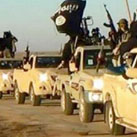Political Branding: From Gandhi to ISIS
Research Fellow, IDSA, Dr Adil Rasheed’s article on political branding, titled ‘Political Branding: From Gandhi to ISIS’ was published in the Al-Arabia website, the Dubai-based Saudi television channel, on August 29, 2017.
- Published: 29 August, 2017







